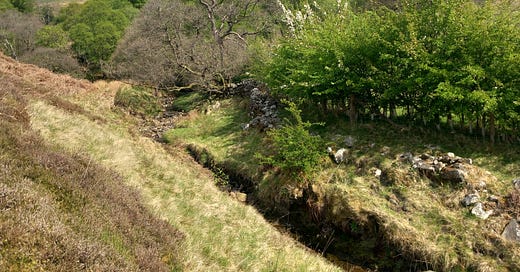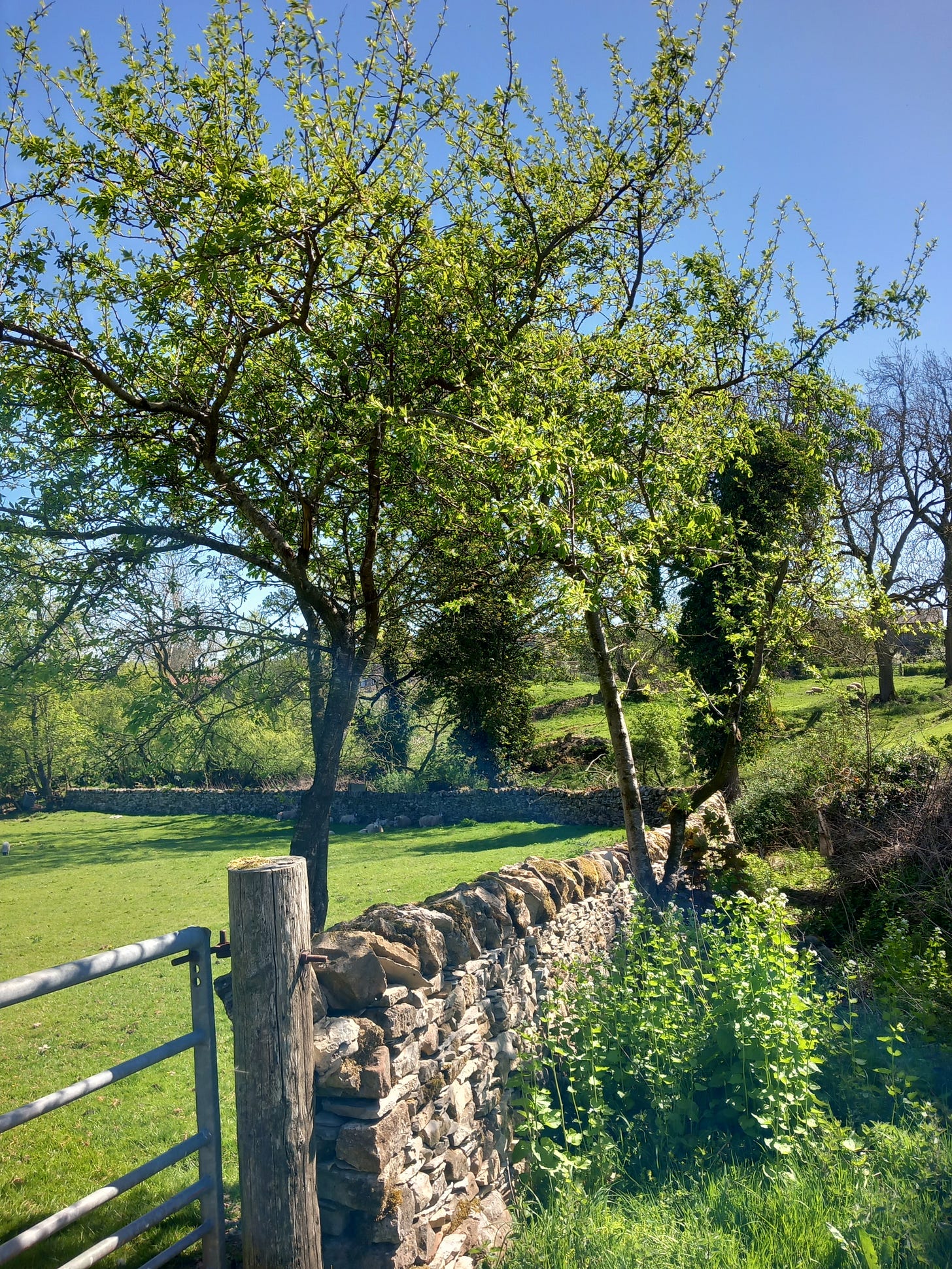Up until the middle of the twentieth century the county of Westmorland in the north-west of England was famous for its damsons. In autumn, Kendal filled with carts coming in from the countryside, laden with fruit. Special trains were put on to take some of the crop south to the jam factories of Lancaster. Fashions change, in fruit as in everything else. Most of the orchards are gone now. But echoes of little dark plums and a blaze of white flowers remain.
Spring blue dawn on the back tracks and by-ways of old Westmorland. A mustering of the militia. Hawthorn, hazel and holly, these three stand fast, holding the line of the hedgerows of England. As they have always stood. Side by side. Interwoven. The steady gaze of High Force Top inspects the ranks and contemplates the loss of elm, the imminent demise of ash.1 Oak and alder are held in reserve.
The air is still asleep. The day is rubbing its eyes, waiting for the kettle to boil. The past is just over those low hills, blue-green with the scattering of light through dew-fall.
You can smell it, faintly, in the dandelion bustle of bumble bees, early to rise.
You can hear it murmur in the cathedral cavities of old drystone walls where calloused hands the size of dinner plates set each piece of the puzzle just so. ‘Easy work,’ they’d say, and wink. ‘Just put each egg back in its own proper nest.’
You know it in the midnight lambing-shed face of the upland farmer as he quad-clatters by, smiling like a child let out early from school. The dog on the shelf of this victorious general’s chariot pretends not to see you, has eyes only for him. A stroppy ewe with twins at foot stands and stamps in the open trailer, her job to remind them that their glory is fleeting.
Hawthorn, hazel and holly. The stitches that hold the land, without which we are undone. The holy trinity of the hedgerow. Hawthorn the mother spirit, right enough. But which the father and which the son is still a bone of contention in the snug bar of the Black Bull, where the dark oak benches have been hollowed backside-smooth. If you want food it’ll be served in the lounge.
The narrow lanes and the green roads buzz with the latest scandals of cherry and wild rose, brazen in their petticoat flurry, turning heads. Be sure of it, the gatepost grins, their flirtation will bear fruit this autumn.
Spring has finally climbed the fellside. Robins, dunnocks, wrens, the hard-pressed rearguards of winter, can at last stand down. They have been relieved by warblers. The siege by storm and frost has been lifted by a skylark. The valley is brimming with the cuckoo’s clowning call, to remind us all that spring’s glory is fleeting.
I am a stranger here. Born outside the bounds of propriety that stretch unseen from Appleby to Dent. This kingdom of heaven has no title deeds. But its edges are sharp enough to those who were born to it, whose lowered rolling vowels are a quantum-coded shibboleth, a mason’s handshake at the Monday market in Kirkby Stephen. There is no route I can take to citizenship. Not even in the grave.
When I pass them on the street I can taste their secrets. Some are tannin tart and others earthy sweet. An old piece of code left in the back of their minds counts the cloudy days and calculates to the hour the crab apples’ ripening. At night they dream of little purple plums. The days of trains from Kendal, laden with goodness for the jam factories of Lancaster, are over. But they know a forgotten lane where an old Westmorland damson, leggy and decrepit, still fruits. They will not tell. In April it blossoms discreetly, hiding its brief spasm of beauty in plain sight. Just days. To remind us that the glory of life is fleeting. And all the sweeter for it.
Elm trees were a powerful presence in the British landscape - tall, elegant and subtle. Beginning in the 1960s, a viral disease slowly took them. Their familiar face is hard to recall now. There have long been whispers of a few old elms surviving in a isolated refuge. Somewhere secret. Best not to know. Ash trees have recently begun to die in large numbers from a different pathogen, for which there is no remedy.






If you “…are a stranger” then I, am just a distant thought, wandering through your words, miles and miles away. Ever thankful for your invitations to travel an unknown land . If I wrote you a letter of all the beginnings and glories of Spring in VT, beginning with the blooming of the Yellow Saucer Magnolia tree, the Red three petaled Trillium flower, surrounded by a whorl of three gorgeous leaves, or the sleeping giant of the mountains, it would be in a foreign language by the time it reaches you. But merging together with your Spring in the Mallerstang Valley, all becomes a part of the same story. The fullness of life. As always, I can never thank you enough for taking me there , showing me every detail. Feeling the land you love.
Thanks David. As always in love with your craft.